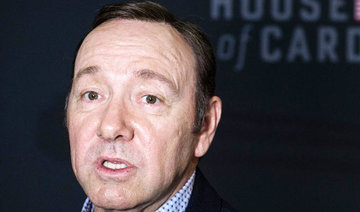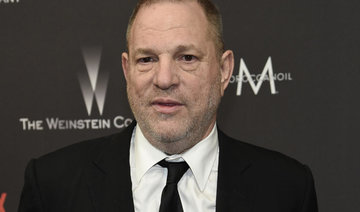MUMBAI: When Indian actress Divya Unny flew into the southern state of Kerala in 2015, she thought it was for a business meeting with an award-winning director about a role in his upcoming film.
Instead, she was called to the director’s hotel room at 9 pm, where the man propositioned her for sex and told her she would have to make compromises if she wanted to succeed in the film industry.
“You always hear of actresses getting called by directors to hotel rooms at night, but I didn’t think twice because I was going in with a reference,” she told Reuters.
Unny said she rejected the advances of the director, whom she declined to name, and left without a role in the movie. Reuters was unable to confirm her accusations.
Three other women involved in India’s film industry, the world’s largest, told Reuters that Unny’s experience isn’t unique. But even after allegations of sexual assault and harassment levelled at Hollywood producer Harvey Weinstein prompted a wave of similar complaints, Bollywood has been reluctant to name and shame perpetrators.
“The way men are being called out in Hollywood right now, I don’t know if it can happen in India,” said Alankrita Shrivastava, a director whose last film, “Lipstick Under my Burkha” was acclaimed for its examination of women and sexuality.
“In terms of how our psychology is, how patriarchy functions, it is much more entrenched,” she said.
The vast majority of Bollywood’s biggest producers and film-makers are men, many from prominent film families who until recently controlled most of the industry.
Mukesh Bhatt, who co-heads production house Vishesh Films, said India’s film industry should not be singled out and was limited in what more it could do to prevent harassment.
“What can we do? We cannot do any moral policing,” Bhatt, told Reuters in a telephone interview. “We cannot keep moral cops outside every film office to see that no girl is being exploited.”
The industry also had to be cautious about false allegations, said Bhatt, who was previously the chairman of apex industry body, the Film and Television Producers Guild of India.
“I am not saying men have not been exploitative. They have been for centuries. But today’s woman is also not as simple as she pretends to be,” he said. “But just as there are good men and bad men, so also there are women who are exploitative and very cunning. Also blatantly shameless to offer themselves.” He declined to provide any examples.
Despite laws requiring Indian companies to form internal committees to investigate sexual harassment at the workplace, very few of cases are reported to the police, said women’s rights activist and lawyer, Flavia Agnes.
“They (companies) may have a committee or they may not have one. They may do an investigation or they may not do one. And they may or may not file a complaint. It could go wrong at every stage,” she said.
Reports of sexual assault, while rare, are not unheard of in India’s film industry.
Earlier this year, Gopalakrishnan Padmanabhan Pillai, a popular actor in the Malayalam film industry best known by his stage name Dileep, was arrested by police who accused him and several others of kidnapping and molesting an actress. Dileep denies the accusations.
“He says it is a completely false case. He was framed by the police and some enemies,” B Raman Pillai, a lawyer for Dileep, told Reuters.
Fans cheered and distributed sweets as he walked out on bail last month after more than 80 days in prison. The police haven’t filed formal charges in court, after which a date for the trial would be set.
“We will file a charge sheet in the next two weeks. Maybe next week,” Biju Paulose, an inspector of police in charge of the case, told Reuters by phone.
Kangana Ranaut is one of the few Bollywood actresses who has publicly spoken out about the sexual assault and harassment. Ranaut, who has appeared in 30 films in the past decade, told Reuters she had faced “severe sexual exploitation and harassment at the work place,” without elaborating.
“I’ve read some stories (about harassment) shared by few prominent people, but most people find it hard to open up about such experiences,” she said. “Victim shaming is very common in our society, it’s done brutally and openly.”
According to a survey conducted by The Indian National Bar Association this year, around 70 percent of Indian women said they would not report sexual harassment at the workplace because they weren’t confident about the complaint mechanism and because of the stigma attached to victims.
Shrivastava, the director, said the kind of cinema Bollywood often produces demonstrates its attitude toward sexual harassment and assault.
For example, two of this year’s hit movies — “Toilet – Ek Prem Katha” and “Badrinath Ki Dulhaniya” — showed the hero stalking the leading lady, taking pictures of her without her knowledge.
“For decades, we have created cinema where harassment is depicted as love,” Shrivastava said. “And that reflects the mentality of the creators – that they keep portraying it, and excusing it in the name of commerce.”
In the wake of Weinstein scandal, some women say Bollywood failing to address harassment
In the wake of Weinstein scandal, some women say Bollywood failing to address harassment

Haql Summer Festival boosts tourism, economy

- Festival offers a wide range of attractions, including an amusement park with electric and inflatable rides
- Visitors can also enjoy restaurants, shopping, and essential services, ensuring a well-rounded experience
JEDDAH: With schools on summer holiday, children and parents are embracing a season of relaxation, exploration, and entertainment.
From coastal getaways to mountain retreats, families across Saudi Arabia are making the most of summer with fun, adventure, and unforgettable memories.
The Haql Summer Festival, being held at Prince Fahd bin Sultan Park, runs until mid-September. It offers a wide range of attractions, including an amusement park with electric and inflatable rides, a family seating area, and an open-air theater featuring traditional performances, competitions, and daily prizes.
Visitors can also enjoy restaurants, shopping, and essential services, ensuring a well-rounded experience, the Saudi Press Agency reported.
The festival aims to boost tourism in Haql, stimulate the local economy, increase commercial activity, and create job opportunities, positioning the region as a unique and attractive destination.
Haql, located in northwest Saudi Arabia in the Tabuk region and overlooking the Gulf of Aqaba, boasts clear views of several neighboring countries’ coastlines.
The festival is part of the Saudi Summer program, which runs until September and showcases the Kingdom’s diverse tourism offerings — from mountains and beaches to international events and exclusive deals, catering to all travelers.
Miniature model helps bring Saudi history to life

- Featuring miniature representations of Saudi cities from the past, these creations transport visitors through time
- Artist and craft trainer Abdullah Al-Khazam, a native of Hail, presented a clay model of the ancient commercial area of Hail city at the event
RIYADH: The Beit Hail Festival, which runs until July 29, is showcasing unique works which reflect the region’s rich historic archaeological legacy, the Saudi Press Agency has reported.
Featuring miniature representations of Saudi cities from the past, these creations transport visitors through time, highlighting the details of daily life and the beauty of historic architecture.
Artist and craft trainer Abdullah Al-Khazam, a native of Hail, has presented a clay model of the ancient commercial area of Hail city at the event.
The model has attracted the attention of thousands of visitors and illustrates the techniques used to craft such works, enriching the festival’s depiction of the Kingdom’s heritage.
Al-Khazam based the model on historic sources, using precise measurements and conducting field visits. He also consulted historians, researchers, and elderly residents for accuracy.
The model features key landmarks, including Barzan Palace, a mosque, the commercial square, and various government offices, the SPA added.
Built with traditional materials such as clay and palm trunks, the model uses classic construction techniques and incorporates period ornaments and engravings, effectively recreating the city center of the past.
The UK’s longest-running Arab arts festival returns

DHAHRAN: The Liverpool Arab Arts Festival, or LAAF, the UK’s longest-running annual celebration of Arab arts and culture, returns this month with a theme that feels both timely and timeless: “Nostalgia.”
Now two decades in, the festival has grown from grassroots beginnings into an internationally recognized celebration.
Running through to July 20, this year’s program explores how memory, heritage and longing shape artistic expression across the Arab world and its diasporas.
The dynamic, bilingual line-up spans film, music, literature, performance, food and family activities — all underscored by deeper reflections on identity, loss and cultural continuity.
Arab News spoke with Taher Qassim, originally from Yemen, who founded LAAF in 1998 as a community-led effort to foster cultural pride and preserve Arab identity in Liverpool.
“The theme of ‘nostalgia’ is a reflection of both how far we’ve come and where we began,” Qassim said. “Twenty-three years ago, we set out on a path that was uncertain but filled with excitement and purpose. We knew we wanted to create something that represented the Yemeni and Arab presence in Liverpool, but we didn’t yet know how to express it.”
What began as a handful of cultural activations has since evolved into a platform for Arab artists. “From those humble beginnings … the festival began to blossom,” he said. “Today, we proudly offer a platform to artists from across the Arab world, Europe, the US, and beyond — something we could only have dreamed of.”
Two events stand out for him: ‘Arabs Are Not Funny’ and ‘The Book of Sanaa.’ The former, he says, “directly challenges the long-held stereotype that Arabs lack a sense of humor. It’s refreshing, bold and liberating — exactly what the festival stands for.”
The latter brings together literature, poetry, food, and a model of Yemen’s historic capital.
“The richness of this event would’ve felt like a fantasy to us two decades ago. Now, it’s a reality — something we’ve made possible through years of dedication and community.”
Qassim, who was awarded an MBE (Member of the Order of the British Empire) in 2008 for services to community cohesion, handed over the festival’s leadership to his daughter, Afrah, who now steers LAAF with the same vision and care.
Today, LAAF is no longer seen solely as a festival for the Arab community. “That perception has shifted dramatically,” Qassim said. “People from all backgrounds and ages attend and engage. The festival has become a space for dialogue, curiosity and connection.” As he put it, “Conversations happen naturally — before, during and after events.”
One event he hopes visitors will not miss is the now-iconic “Family Day” at the Palm House in Sefton Park. “It’s become the signature event of the Liverpool Arab Arts Festival — our legacy day,” he said. “Families travel from across the UK, Europe, and even further afield to be part of it. The atmosphere is joyful, welcoming, and truly inclusive … a vibrant, heartwarming celebration of Arab culture at its best.”
Some events require tickets, but “Family Day” — an afternoon of music, crafts, performances and community — is the grand finale and free to all.
May Calamawy promotes Palestinian film’s North American run

DUBAI: Egyptian Palestinian actress May Calamawy took to social media on Saturday to promote Palestinian film “To A Land Unknown.”
Distributed by Watermelon Pictures, the film is directed by Mahdi Fleifel and stars Angeliki Papoulia, Mahmoud Bakri, Manal Awad and Aram Sabbah.

May Calamawy took to Instagram Stories to share news that “To A Land Unknown” is on a 40-screen cinema run in North America this month, including showings in New York, Houston and Vancouver.
“Reda and Chatila are two Palestinian cousins hustling their way through the underbelly of Athens pursuing their dream of making it to Germany. But as their hardship grows, so too does their desperation. When Chatila hatches a reckless all-or-nothing plan, it strains their bond and pushes the limits of what they will do for freedom,” the film’s logline reads.
The film was awarded the Silver Yusr Award December’s Red Sea Film Festival in Saudi Arabia.
Watermelon Pictures was co-founded by Alana Hadid, the sister of supermodels Gigi and Bella Hadid. Hadid — along with brothers Badie Ali and Hamza Ali — co-founded Watermelon Pictures, a production company with a mission to create compelling, impactful stories that resonate with global audiences.
“I was honored to be asked to be the creative director of Watermelon Pictures. I think it’s not only a passion project for Hamza and Badie, but it is an opportunity for Palestinians to have a place to go to tell their stories … I get emotional about it. I think it’s just one of the most beautiful things that people have a place where they can put their stories. And we know that we have a safe place for that,” Hadid previously told Arab News.
For her part, Calamawy is known for her roles in US Netflix series “Ramy” and “Moon Knight” (2022), where she plays dual characters Layla El-Faouly and the Scarlet Scarab.
She made headlines in late 2024 when almost all her scenes were cut from Ridley Scott’s “Gladiator II,” with fans taking to social media to complain.
Her casting in the film was first announced in May 2023.
At the time, Deadline reported that Scott had cast Calamawy after a lengthy search, writing: “While many of the leading roles were straight offers, Scott wanted to do a similar search he did for the (Paul) Mescal part for the role that Calamawy ultimately landed.”
However, fans noticed that in the final cut, which hit cinemas in November, Calamawy is only seen in passing and she has no dialogue.
Christie’s London to feature retrospective on Syrian artist Marwan

DUBAI: Christie’s is poised to host a non-selling exhibition of work by late Syrian artist Marwan Kassab-Bachi, titled “Marwan: A Soul in Exile.”
Taking place from July 16- August 22, the show was curated by Ridha Moumni, chairman of Christie’s Middle East & Africa.
This retrospective exhibition will display more than 150 works on loan from museums, institutions and private collections in Europe and the Middle East. The exhibition traces the artist’s career, from his artistic beginnings in Syria to his prolific output in Germany, his adopted homeland, where he spent six decades of his life.
“I wanted to highlight the essential threads running through his career: from his iconic ‘Face Landscapes’ to the celebrated ‘Heads,’ his journey from Damascus to Germany, and the pivotal moments that shaped his legacy — including his major 1976 retrospective at Charlottenburg Schloss, which established his place in the German art scene,” Moumni told Arab News.
“Equally important is his enduring connection to Syria and the Arab world,” he added.
With paintings, works on paper, and editions from 1953 until 2014, this exhibition offers audiences in London the chance to explore the artist’s multi-disciplinary approach.
“Over the past two years, our aim has been to introduce artists and artistic scenes to London that people here don’t often get to see. One of our deepest commitments is to highlight the richness of artists from the Arab world or of Arab heritage. Marwan embodies this mission beautifully: a towering figure from the Syrian diaspora, who built an extraordinary career in Germany, and had a big impact on modern portraiture,” Moumni said of Christie’s decision to spotlight the artist this summer.
In 1957, Marwan moved to Berlin and attended the Hochschule fur Bildende Kunste, graduating in 1963. The artist, who is referred to by his first name, joined a group of German expressionist painters that included Georg Baselitz and Eugen Schonebeck, but he retained his Syrian identity and engaged with social and political issues of the Middle East through his work.
“For those who already know his work, I hope they uncover new depths — its poetic power, its meditations on exile, identity, and belonging. Above all, I hope visitors feel a true connection to Marwan’s work,” Moumni said.
















